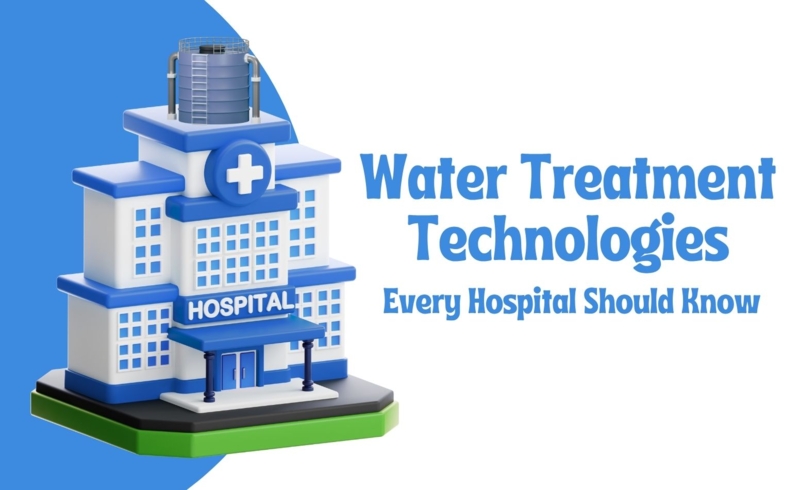Water Treatment Technologies Every Hospital Should Know About
Published on by Shibani Thakur, waterapp2021@gmail.com in Business
There needs to be water in healthcare buildings so that they can be clean, germ-free, and safe for patients and lab tests. But water that hasn't been cleaned or is dirty can be very bad for your health and can make you sick or spread diseases. It is not only necessary to clean water well, but it is also a very important part of making hospitals clean and safe. Hospitals can keep up high standards for cleaning and patient safety if they know how to use and know the right Water Technology for treating water.

The Importance of Water Treatment in Hospitals
Dialysis and surgical instrument sterilization require clean water in hospitals. Any amount of pollution can harm people or pricey medical equipment. Waterborne Legionella and Pseudomonas illnesses make hospital cleaning harder. Proper water cleansing is essential. Hospitals now prioritize cleanliness and environmental protection. Good Water Technology makes sure they follow these rules and reduces waste.
Reverse Osmosis (RO) Systems
One way that hospitals clean their water that they use a lot is reverse osmosis (RO). Water is forced through a barrier to remove dissolved salts, bacteria, and chemical contaminants. Dialysis center water must be clean to prevent illness. They are also used in labs and cleaning units to ensure water is clean and won't contaminate tests or equipment.
Ultraviolet (UV) Disinfection
Ultraviolet (UV) light is another Water Technology for hospitals to clean water. Ultraviolet light is shined on water to kill bacteria, viruses, and protozoa without using chemicals. This technology is often used as the last step to kill any germs after RO or cleaning. UV systems are safe for the climate, don't need much maintenance, and don't use much power. Because of this, they are great for healthcare settings that don't want to leave behind chemical waste. They help keep germs from growing in hospital lines, which makes it less likely that someone will get sick.
Ozonation Technology
This process cleans water by getting rid of both organic and artificial toxins. It is called ozonation. Hospitals use devices that use ozone to clean the water in their cooling towers and the trash. They are also used to clean clothes and cleanse things. The water is better and cleaner because ozone doesn't leave behind any harmful chemicals like chlorine does. It does a great job of keeping biofilm from building up in water systems, which is very important for keeping the hospital clean.
Ultrafiltration (UF) Systems
Ultrafiltration cleans water by getting rid of solids, germs, and viruses that are floating in it. This method can be used on its own or as a step before RO systems to clean water. Hospitals use ultrafiltration to make sure the water in operating rooms, labs, and patient areas is clean. It's good for big healthcare places that use a lot of water every day because it can handle a lot of water quickly.
Chemical Dosing and Softening Systems
A lot of hospitals have trouble with hard water, which can damage medical equipment like heaters, sterilizers, and more. Things that soften water use ion exchange to help get rid of the calcium and magnesium ions that make water hard. So that the pH of the water stays stable and lines don't scale or rust, controlled chemical dosing systems are also used. It is possible for Water Level Sensor For Business to work together to protect infrastructure, make equipment last longer, and keep hospital operations running easily.
Wastewater Treatment and Recycling
Hospital wastewater is very bad for the environment because it contains germs, drugs, and disinfectants. Water treatment plants today use a mix of biological, chemical, and membrane-based methods to get rid of harmful substances and make the water safe to use or release. You don't have to drink recycled water. It can be used for washing, farming, or cooling systems. This is better for the earth and uses less water for the hospital.
Taxonomy
- Water Management & Security
- Integrated Water Management
- Water Management
1 Comment
-
Another application, water used for radiant cooling & heating instead of traditional AC. Greater efficiency, comfort, and health safety with no drafts or noise